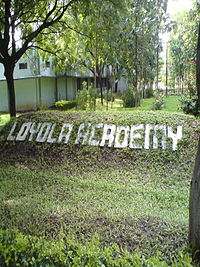Loyola Academy, Secunderabad
Loyola Academy Degree and PG College is a private Catholic minority higher education institution run by the Jesuit priests of the order of the Society of Jesus situated in Old Alwal (Telangana), India.[1] It was established by Rev Fr Baliah SJ in 1976 The college is affiliated with the Osmania University and was granted the status of autonomy in 1992 by the University Grants Commission {UGC).
 | |
| Motto | Estu fistor estu deferent |
|---|---|
| Type | Private Catholic |
| Established | 1976 |
| Founder | Rev Fr T. Baliah, SJ |
Religious affiliation | Roman Cathoolic (Jesuit) |
Academic affiliations | UGC, NAAC |
| Rector | Rev.Fr.Raju Soosaimanickam,SJ |
| Principal | Rev. Fr. Pothireddy Anthony, SJ |
Academic staff | 148 |
| Address | Old Alwal, Jeedimetla , , , |
| Campus | Urban 132 acres (53.4 ha) |
| Website | www.loyolaacademyugpg.ac.in |

History
The academy started with an intermediate course in 1976, followed by a three-year course called associate degree of Chemical Technology (ADCT) in 1977.
Loyola Academy is managed and administered by the Jesuits of Andhra Jesuit Province of the Society of Jesus, an international Catholic religious order. Loyola Academy, Degree and Post Graduate College as well as Loyola Academy Junior College were founded by Fr. T. Balaiah, SJ in 1976 at Old Alwal, Secunderabad, Andhra Pradesh, India.[2][3]
Loyola Academy has a campus of 138 acres, with playfields and farm. The University Grants Commission (UGC) awarded the rare status of "College with Potential for Excellence" to the college and also extended CPE phase II projects. The National Accreditation Council awarded Grade ‘A’ to the institution in recognition of its contribution to the cause of higher education in 2005. The college is undergoing NAAC reaccreditation.
‘India Today’ rated the college for the third consecutive year by giving First Rank among the city colleges of Hyderabad and Secunderabad, for Commerce, Science and Arts. The college is under autonomous status from 2010 on.
Courses
Courses and year of commencement
Undergraduate courses:
- B.Sc. Chemical Technology -1978
- B.Sc. Agricultural Science & Rural Development -1983
- B.Sc. Computer Science & Engineering -1988
- B.Sc. Electronic Technology -1991
- B.Com Honours -1991
- B.Sc. Computer Maintenance & Engineering -1994
- B.Com Advertising, Sales Promotion & Sales Management -1994
- B.Sc. Bio-technology, Chemistry & Genetics -2001
- B.Com Insurance -2003 (closed)
- B.Com General/Business Studied - 2003
- B.A. Mass Communication -2004
- B.Sc. Food Technology & Management -2004
- B.A. Psychology, English & Journalism -2006
- B.Sc. Maths, Statistics & Computer Science -2007
- B.Sc. Multimedia & Animation Design -2008
- B.A. Economics, Maths & Computer Science -2008 (Closed)
- B.A. History, B.A.Sociology& B. A. Public Administration -2008 (Closed)
- B.Com Computers -2010
- Bachelor of Business Administration -2011
- B.Com International Accounting and Finance -2016
- B.Com Computer Data Science & Analytics Engg. -2016
- B.Com (Hons)Strategic Finance -2018
- B.Com Business Process Management -2018
- B.Sc. Food Science, Nutrition & Dietetics -2018
Postgraduate courses
- MCA -1993
- MBA -2001
- M.Sc (Organic Chemistry) -2003
- M.Sc. (Biotechnology) -2006
- M.Sc. Analytical Chemistry -2010 (Closed)
- M.Sc. Food Technology & Management -2013
Campus
The campus is spread over 133 acres (0.54 km2).[5]
Accreditation
The institution was accredited with 'A' grade by NAAC in 2006 and was reaccredited with 3.50/4.00 scale by the NAAC in 2011. It was awarded the rare status of "College with Potential for Excellence"[5] by the UGC, Govt. of India.
References
- "Ex-staffer of school dies". The Hindu. 14 January 2011. ISSN 0971-751X. Retrieved 28 November 2016.
- "Introduction to Loyola".
- "History".
- "Courses". Retrieved 14 October 2017.
- "Archived copy". Archived from the original on 21 July 2011. Retrieved 12 January 2011.CS1 maint: archived copy as title (link)